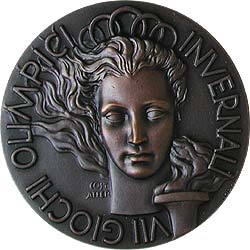|

|

|
|
|
|
|
|
Medal Information |
| |
Summer Olympics
1896 Athens, Greece
1900 Paris, France
1904 St.Louis, USA
1906 Athens, Greece
1908 London, England
1912 Stockholm, Sweeden
1920 Antwerp, Belgium
1924 Paris, France
1928 Amsterdam, Netherlands
1932 Los Angeles, USA
1936 Berlin, Germany
1948 London, England
1952 Helsinki, Finland
1956 Melbourne, Australia
1960 Rome, Italy
1964 Tokyo, Japan
1968 Mexico City, Mexico
1972 Munich, Germany
1976 Montreal, Canada
1980 Moscow, USSR
1984 Los Angeles, USA
1988 Seoul, Korea
1992 Barcelona, Spain
1996 Atlanta, USA
2000 Sydney, Australia
Winter Olympics
1924 Chamonix, France
1928 St.Moritz, Switzerland
1932 Lake Placid, USA
1936 Garmisch, Germany
1948 St.Moritz, Switzerland
1952 Oslo, Norway
1956 Cortina, Italy
1960 Squaw Valley, USA
1964 Innsbruck, Austria
1968 Grenoble, France
1972 Sapporo, Japan
1976 Innsbruck, Austria
1980 Lake Placid, USA
1984 Sarajevo, Yugoslavia
1988 Calgary, Canada
1992 Albertville, France
1994 Lillehammer, Norway
1998 Nagano, Japan
2002 Salt Lake City, USA
| |
|
|
|
|
1956 WINTER OLYMPIAD
CORTINA, ITALY
|

Hold mouse over image to view reverse.
If the image does not load, simply hit refresh.
|
Composition: | Bronze |
Shape: | Round |
Diameter: | 45 mm |
Thickness: | 7 mm |
Weight: | 48 grams |
Edge: | Plain |
Mintage: | 2,532 |
Designer: | Constantion Affer |
|
|
| DESCRIPTION |
The obverse depicts the head of “Victory” crowned with the Olympic rings and surrounded by the legend VII GIOCHI OLIMPICI INVERNALI. An Olympic torch rests at five o’clock. The reverse has the Olympic motto CITIUS ALTIUS FORTIUS and CORTINA 1956 along the periphery with the Cortina emblem (snowflake over Mt. Pomagagnon) at the center. The medals were presented in an orange paper box with the mint’s (Lorioli Brothers) address and phone number printed on the inside.
|
THE GAMES |
The 1956 Winter Olympics, held in Cortina d’Ampezzo, Italy, were most notable for the first appearance by a team from the USSR. The Soviets immediately won more medals than any other nation. Their speed skaters won three of the four events, while their ice hockey team ended Canada’s domination. Pavel Kolchin became the first non-Scandinavian to earn a medal in cross-country skiing. Anton Sailer won all three men’s races in Alpine skiing - the first clean sweep in Olympic history. Madeleine Berthod celebrated her birthday by winning the downhill by an amazing 4.7 seconds. The United States began to emerge as a definite power in figure skating as Tenley Albright won the women’s title and Hayes Alan Jenkins led an American medal sweep on the men’s side. The Cortina Games were the first to be televised and the last at which the figure skating competitions were held outdoors
|
|
|
| |
